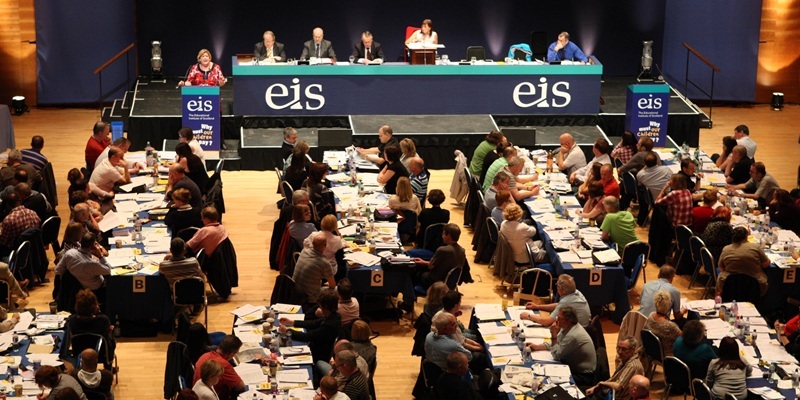Scotland’s biggest teaching union has threatened industrial action over any further attacks on pay and conditions but held back from committing to a ballot before the outcome of a major review of teaching is known.
Delegates at the EIS annual general meeting in Perth Concert Hall on Friday voted 187 to 113 against a motion that would have seen tens of thousands of members asked to back strikes by November. Among those opposed to the move was Eric Baillie, a member of the union’s ruling council from Dundee, who said it would be a “huge strategic error.”
However, another motion proposed by several of the union’s local associations including Fife to oppose changes to conditions of service, using industrial action if necessary, was supported unanimously.
Delegates also backed a call to hold a ballot later in the year on boycotting development work related to Curriculum for Excellence (CfE) over concerns it has been introduced too quickly and has placed too heavy a workload on teachers.
EIS general secretary Ronnie Smith told the AGM that teachers had to stand united to fight the budget-cutting agenda facing Scottish education and warned, “We are far from seeing the light at the end of the tunnel. We face many more and serious challenges ahead.”
A review of the profession, chaired by Professor Gerry McCormac, is under way and is expected to report in September at the earliest.
“It is unfortunate that this review is working in such a straitened economic climate and I welcome the assurances they have given us that they will not be a stalking horse for a cuts agenda,” Mr Smith said. “It is critically important that they do not fall into that trap if they are to have any credibility in the eyes of the teaching profession.”
He claimed that local authorities umbrella body CoSLA was concerned only with saving money, adding, “Educational considerations are cast aside. The education lights have gone out at CoSLA.”
In its submission to the McCormac Review, CoSLA said teachers should spend more time in the classroom, lose their dedicated time for marking and preparation and take training days during school holidays. Mr Smith described the proposals as “a conscious attack on the professionalism and autonomy of teachers.”
He added, “Teachers are not even to be seen primarily as teachers of pupils but as some kind of generic local authority worker, open to being called upon to work wherever and whenever their managers decide and carrying out such tasks as their managers demand. Professional development is reduced to what fits the employer’s agenda and instead of having a coherent career structure teachers will be offered the occasional titbit of a little envelope of money here in return for a little bit of extra work there.”
Mr Smith said teachers were already facing real cuts in living standards thanks to a two-year pay freeze, which was agreed in talks with CoSLA and the Scottish Government and then narrowly backed in a ballot by EIS members. There were also fears of a rise in pension contributions. “There is a limit to what teachers will put up with and I think this AGM is sending a very clear message how close to that limit we are.”
The call for a ballot on industrial action by November was proposed by a member of the EIS Council, Anne McCrae of Edinburgh, who said the employers’ aim was to spend less and get more. The union needed to prepare for a vote at the earliest opportunity rather than make “vague noises and vague comments,” she argued.
She was backed by Charles McKinnon from Glasgow, who said teachers were facing “a complete onslaught” on their conditions of service.
However, former union president Helen Connor said that, while CoSLA’s submission was “despicable” and she was “100% committed to industrial action,” there was a need to wait for the outcome of the McCormac Review “because otherwise what can we ballot our members on?”
Delegates instead backed a motion that retains the option of industrial action but without a specific timetable. They also supported a call from the union’s ruling council to demand that any proposed changes to pay and conditions which emerge as a result of the review are subject to “full and proper negotiation” with the teaching unions.
The AGM also saw concerns expressed about the implementation of Curriculum for Excellence, which the Scottish Government argues is intended to broaden pupils’ learning, make lessons less prescriptive and give teachers more flexibility. There was strong backing for a motion instructing the EIS Council to organise a ballot to boycott any further development work on CfE.
Michael Dolan from West Dunbartonshire said members of his local association had watched with “incredulity” as the union supported CfE. He believed the changes involved had been “all too much” and teachers had not had the time and resources they needed.
Tory education spokeswoman Liz Smith said, “The threat of any industrial action will be hugely concerning to parents and pupils. We sincerely hope it does not come to that as we all want what is best for our schools.
“The CoSLA submission must not be seen as an attack on teachers but as an attack on the system. It fully exposes the unacceptable tensions which currently exist between national and local government when it comes to looking after the best interests of the teaching profession.”
Labour education spokesman Ken Macintosh said, “The new Curriculum for Excellence has huge potential to transform Scotland’s education system but, given the government’s woeful handling of its implementation, it is hardly surprising teachers are at the end of their tether.
“Parents and pupils are still waiting to see what the new examinations will look like and this is already a challenging time for our teachers. It is vital Mike Russell engages with them constructively and ensures they receive the support they need to make a success of Curriculum for Excellence.”
